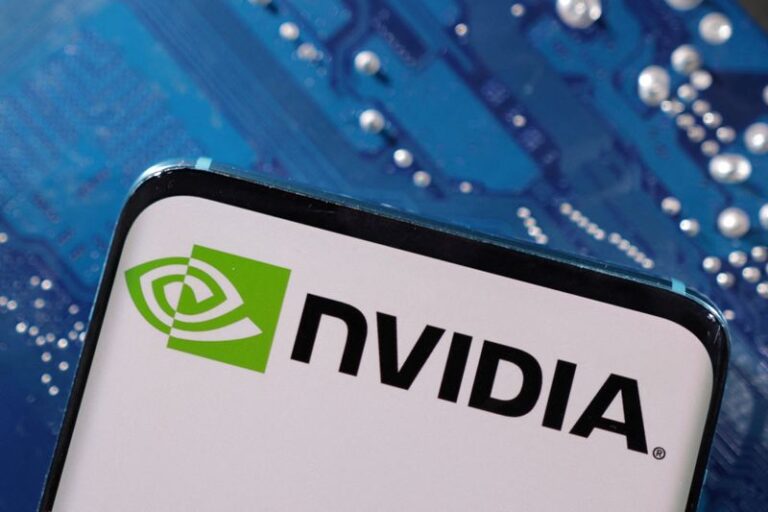By Noel Randewich and Saqib Iqbal Ahmed
(Reuters) – Chipmaker Nvidia Inc’s earnings report disappointed investors who had hoped it would bolster new profits for Wall Street’s most valuable companies, sending shares of big technology companies lower and Asian stock markets also slumping on Thursday.
Nasdaq futures initially fell about 1% following Nvidia’s quarterly earnings report late Wednesday, suggesting traders were expecting a decline in tech stocks.
Nvidia’s stock price fell nearly 7%, shedding $200 billion from its market cap after it said its third-quarter gross profit would likely fall short of expectations, while its revenue was roughly in line with market expectations. Several other AI-related companies also lost a combined $100 billion in market cap.
Broadcom and Advanced Micro Devices shares each fell about 2%, while Microsoft and Amazon were down about 1% each.
Tech weakness continued in Asian markets on Thursday, with Nvidia’s chip contractor TSMC falling 2% and losses in other tech stocks weighing on stocks in Tokyo and Seoul, and South Korea’s KOSPI falling to a two-week low. [.T] [.KS]
Nvidia shares in Frankfurt were down slightly in after-hours trading, down 5%. Even if Wednesday’s decline continues into Thursday, it would still fall far short of the 11% move options markets have priced for the company’s shares, according to data from options-analysis firm ORATS.
Surging demand for AI chips has helped Nvidia beat analyst expectations for several quarters, leading investors to expect the company to beat expectations with higher profit margins.
Nvidia’s weak outlook overshadowed better-than-expected second-quarter revenue and adjusted profit and the company’s announcement of a $50 billion share buyback.
“They won, but this is just one of those situations where expectations were high. I’m not sure they delivered numbers that people were happy with,” said JJ Kinahan, CEO of IG North America and president of online broker Tastytrade.
The muted reaction to Nvidia’s earnings report could help set the tone for market sentiment heading into a historically volatile period. The S&P 500 lost an average of 0.8% in September, its worst monthly performance since World War II, according to CFRA data.
Investors are also watching next week’s U.S. employment report for signs that the labor market weakness that rocked stocks in early August has subsided.
Optimism about AI technology, fueled in part by Nvidia’s explosive growth, has driven stock prices on Wall Street over the past year.
But confidence in stock rallies has been shaken in recent weeks after earnings season saw investors harshly criticize tech stocks that failed to live up to their lofty valuations.
Investors are also growing concerned that Microsoft, Alphabet and other big companies are already investing heavily in the race to dominate emerging AI technologies. Shares of Microsoft and Alphabet have remained depressed since last month’s announcement.
Nvidia expects third-quarter revenue of $32.5 billion, plus or minus 2%, compared with the average analyst estimate of $31.8 billion, according to LSEG data, which would represent an 80% increase from the same period last year.
The Santa Clara, California-based company now expects adjusted gross margin to be 75%, up +/- 50 basis points, for the third quarter. Analysts on average expect gross margin to be 75.5%, according to LSEG data.
Nvidia shares fell 2.1% in trading Wednesday before the earnings report. The company is up about 150% so far in 2024, making it the biggest winner in Wall Street’s AI stock rally.
Nvidia’s shares were valued at 36 times forward earnings prior to the quarterly earnings release, a discount to its five-year average of 41. The S&P 500 is trading at 21 times forward earnings, a discount to its five-year average of 18.
(Reporting by Noel Landewicz in San Francisco; Additional reporting by Saqib Ahmed in New York; Editing by Ila Iosebashvili, Lisa Shmaker and Mark Potter)


